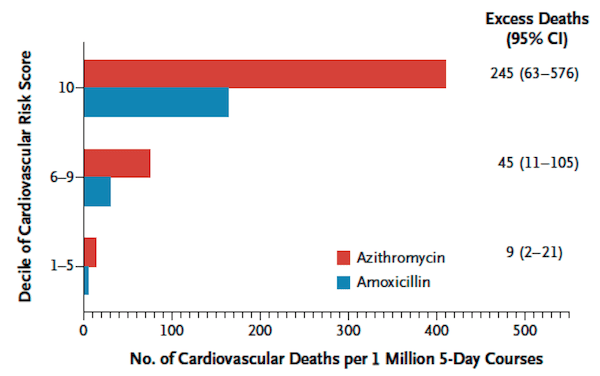 In 2011, Azithromycin was the 7th most prescribed (55.3 million prescriptions) medication according to IMS Health. There have been several publications indicating that the use of macrolide antibiotics, increase risk of serious ventricular arrhythmias and sudden cardiac death (FDA Adverse Event Reporting System). Specifically, 2 recent studies in the NEJM were published looking at the risk of Azithromycin with cardiovascular death and received lots of press.
In 2011, Azithromycin was the 7th most prescribed (55.3 million prescriptions) medication according to IMS Health. There have been several publications indicating that the use of macrolide antibiotics, increase risk of serious ventricular arrhythmias and sudden cardiac death (FDA Adverse Event Reporting System). Specifically, 2 recent studies in the NEJM were published looking at the risk of Azithromycin with cardiovascular death and received lots of press.
Study #1: [1]
What they Did:
- Retrospective, Observational Cohort Study
- Tennessee Medicaid Cohort
- Compared
-
- No antibiotics (1,391,180 prescriptions)
- Azithromycin (347,795 prescriptions)
- Amoxicillin (1,348,672 prescriptions)
- Detect an increased risk of death
Primary Outcomes:
- Cardiovascular death
- Death from any cause
Results:


- Cardiovascular Risk Factors in This Study: Smoking, high BMI, poor diet, and low physical activity
- NO statistically significant risk of death after the 5 day course of azithromycin completed
Limitation:
- Observational, non-randomized clinical trial
Conclusion: During 5 days of azithromycin therapy, there is a small absolute increase in cardiovascular deaths and most pronounced in patients with a high baseline risk of cardiovascular disease
Study #2: [2]
What they Did:
- Retrospective, Observational Cohort Study
- Danish Adults
- Compared
-
- No antibiotics vs Azithromycin (1,102050 prescriptions compared in 1:1 ratio)
- Azithromycin vs Pencillin V (1,102,419 prescriptions vs 7,364,292 prescriptions)
Primary Outcomes:
- Cardiovascular Death
Results:
- No increase in cardiovascular death with recent or past use of azithromycin
- No increase in cardiovascular death in patients with no history of cardiovascular disease
- There is an increase in cardiovascular death in patients with a history of cardiovascular disease
Limitations:
- Did not have information of known risk factors for cardiovascular disease (smoking and BMI)
- Number of events in the subgroup analysis is low
Conclusion: Azithromycin use is not associated with an increased risk of death from cardiovascular causes in a general population of young and middle-aged adults
Take Home Points:
- In the second study the patient population had better cardiovascular health than the first study
- The increased cardiovascular risk may be from the systemic infectious process and not azithromycin itself
- You can still prescribe azithromycin, but remember the small increased risk of death in patients with cardiovascular disease and/or > 65 years of age
References:
- Ray WA et al. Azithromycin and the Risk of Cardiovascular Death. NEJM 2012. PMID: 22591294
- Svanstrom H et al. Use of Azithromycin and Death from Cardiovascular Causes. NEJM 2013. PMID: 23635050
For more on this topic:
- Listen to the podcast with my good friend Ken Milne over at The Skeptics Guide to Emergency Medicine: SGEM#76: And the Beat Goes On (Azithromycin and Risk of Cardiovascular Death)
- Josh Farkas at PulmCrit: Brief Rant – Still no Evidence That Azithromycin Increases Mortality



